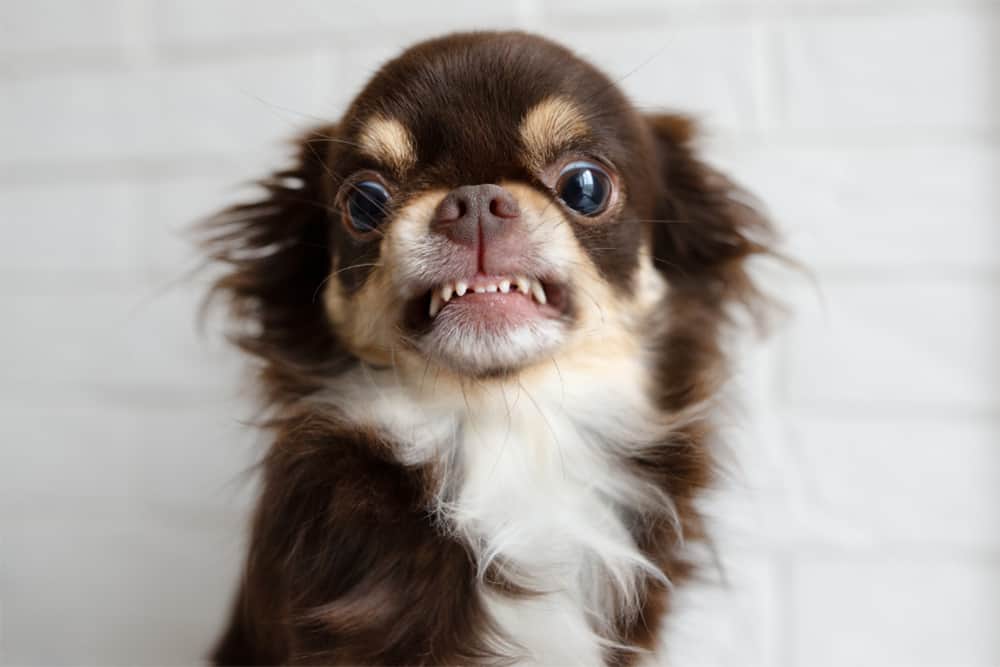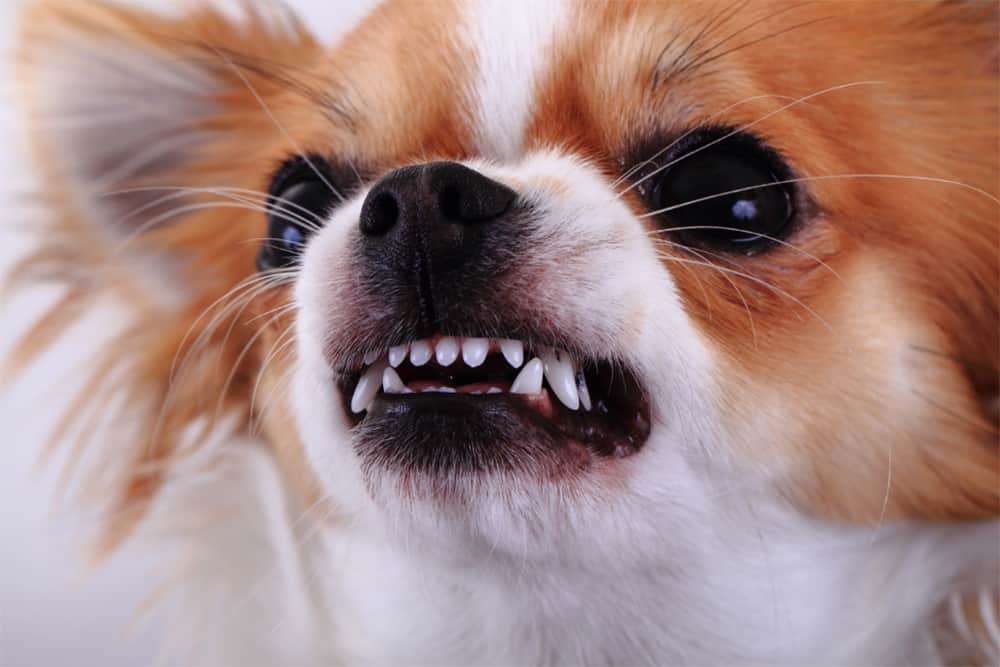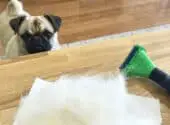Chihuahuas are considered by many to be cute little dogs, with their aggressive behavior often dismissed as “being cute” and nothing serious for owners to worry about.
However, while a snarling and snapping Chihuahua may not be as dangerous as a larger breed of dog, they’re still capable of causing harm or damage. This is particularly true for young children and elderly people.
Therefore, it’s important to stamp down your authority and make sure your pooch is respecting your authority.

Chihuahuas act aggressively for the same reasons that all dogs do, so it’s important to treat them in a similar manner when it comes to behavioral training.
With this in mind, we’ve compiled an in-depth guide taking a look at the main reasons why Chihuahuas often demonstrate aggressive behavior and the most effective methods of controlling and preventing it.
We’ll also look to answer some of the frequently asked questions related to the topic.
Why Are Chihuahuas Aggressive?
The simple answer is that Chihuahuas are a highly territorial breed of dog. Therefore, they’re not afraid to defend their personal space and confront anyone unfamiliar that threatens to breach it.
Furthermore, it also takes them a considerable amount of time to befriend people – especially if they’re more than one year old. In order to overcome their defence mechanism of aggressive behavior, owners and friends have to try and gain the trust and respect of a Chihuahua.
We’ll now take a more detailed look at some of the main reasons Chihuahuas choose to exhibit aggressive behavior when placed in certain situations.
Previous Abuse
Just like humans, dogs can suffer from post-traumatic stress disorder, meaning that they’re able to recall dangerous or stressful experiences in their life.
If you’ve adopted your Chihuahua, it’s likely that you won’t have a full picture of their previous life, so do your best to get information and learn as much as you can about them from their previous owners.
It’s also a good idea to dig up past records from their vet to inform yourself about any potential triggers they may have so you can avoid them.
Territory
As mentioned previously, Chihuahuas are extremely territorial creatures, with many people describing them as more defensive than friendly. Therefore, if you approach them or disturb them while they’re sleeping or eating in one of their favorite spots, don’t be surprised if they snap at you.
Fortunately, there are some warning signs to look out for when a Chihuahua feels like their territory is being threatened. Listed below are five of the most common.
- Showing teeth – when most Chihuahuas get angry, they’ll start to show their teeth as a warning to back off and give them some space. If you don’t comply with this warning, there’s every chance that they’ll bite you.
- Growling – more often than not, this is their first move before attacking. They can also make the noise if they’re scared of something and want to sound intimidating.
- Tail stops wagging – as I’m sure you know, dogs wag their tails when they’re happy. When their mood changes for the worse, their tail will stand still and slowly move from side to side. Chihuahuas that feel threatened will also stay close to an object they’re looking to protect.
- Muzzle “punching” – while humans tend to punch with their fists, Chihuahuas use their noses. They may also motion to bite you if they’re especially stressed.
- Rigid posture – this means that your pooch isn’t just angry, they’re thinking about taking you down. If you notice your Chihuahua demonstrating a stiff posture, look away and slowly walk in the opposite direction.
New Faces
Meeting new people can be a daunting experience for Chihuahuas, and one which they try to handle by being defensive and aggressive.
While this may be frustrating and a little embarrassing, you shouldn’t give up. It takes time for a Chihuahuas to feel comfortable around new people after their one-year socialization period.
In order to rectify this problem, try and expose your dog to new people on a regular basis and visit lots of new places. The more they learn that new places and people aren’t scary or threatening, the less aggressive their behavior will be.
Moving Around
Chihuahuas love the feeling of security, so if you move homes frequently, this can cause them a great deal of stress while they try to adjust to their new surroundings.
They have to get used to a range of new things, including new smells, spots, other pets, voices, and potentially new people.
With all this in mind, it’s important to provide your pooch with a secure spot where they feel entirely safe. This could be a sheltered spot in the corner of a room or a large crate that contains plenty of toys and food bowls.
Anxiety
Chihuahuas can often demonstrate some aggression because of anxiety they may be experiencing. This is why dogs tend to bark at things that scare them.
Noise anxiety is prevalent among most dogs as they tend to get frightened and feel threatened by loud noises such as torrential rain and thunder.

Another common source of stress is separation anxiety.
This is usually triggered when your dog is left on its own for prolonged periods of time, and can often result in destructive behaviors such as chewing furniture, breaking glass, and scratching at doors.
Dominant Attitudes
While Chihuahuas are renowned and adored for their courageous personalities, this does make them rather commanding and prone to prey on submissive animals or weak-willed people. In other words, they’ll effectively bully anyone who’s likely to bow down to them.
If you want to counter this dominant attitude and gain some control over your Chihuahua, it’s important to say “no” to them through authoritative commands and a stern demeanor.
As tempting as it may be to laugh when they’re misbehaving and being naughty, this won’t do you any favors in terms of tempering their dominant personality. Make sure you’re firm and straight to the point.
Health Problems
Dogs have evolved over time to hide any weakness, allowing them to survive a number of generations of predation. Unfortunately, this makes it incredibly challenging for dog owners to notice diseases or health problems until their pet is in excruciating pain.
This is why it’s important to keep a close eye on your Chihuahua. If they become aggressive or defensive when you pet them, there’s every chance that they’re injured.
Some of the most common health problems to look out for include obesity, swelling, and bone-related issues such as arthritis, hip dysplasia, and kneecap dislocations.
19 Tips To Stop Aggressive Behavior
Now that we’ve addressed and explained a number of the main reasons why Chihuahua often exhibit aggressive behavior, it’s important to take a closer look at some of the most effective ways to prevent aggression. Keep reading below for 19 of our key tips to keep in mind.
1. Plenty Of Outdoor Play
As is the case with the vast majority of dogs, Chihuahuas have a period of socialization after they’re born. This usually lasts for around a year, and during this time it’s important to regularly take them outside in order to gradually introduce them to worldly stimuli.
If you take your pooch to a dog park, try to interact with other dog owners as much as possible as this will get your Chihuahua used to the sound of people talking.
It’s also beneficial to introduce your dog to other dogs. Just make sure that you follow the correct dog-playing etiquette, as behavior can change very quickly during play.
Some of the common signs to look out for include excessive barking, stiffness, and roughhousing. If you notice any of these signs, position yourself between the two dogs and separate them before your Chihuahua feels unsettled or gets hurt.
2. Proper Training
Although most Chihuahuas have a tendency to be aggressive, you can encourage calmer behavior through proper training.
One of the best methods of training is to use commands such as “sit”, “stay”, and “quiet” to control your pooch. For example, using “sit” or “quiet” will allow you to control any excessive barking or overly-physical behavior if you have visitors to the house.
If you’re struggling to teach your Chihuahua basic commands, make sure you reward them with treats every time they make improvements. This positive reinforcement is a great tool to use to your advantage.
3. Check For Fear
Chihuahuas don’t just get angry and aggressive because they’re enraged. Often, they’ll be afraid of something and therefore require reassurance and support from their owner. For example, loud music may scare your pooch and cause them to be aggressive.
If you suspect that fear may be the root of your dog’s aggression, it’s a good idea to take your Chihuahua to a trainer for evaluation. They’ll be able to give them a thorough assessment, and recommend specific desensitization sessions.
These sessions usually involve your dog being exposed to the stimuli or situation they’re most afraid of in order to normalize it as much as possible and make them realize there’s no harm.
4. Trips To Daycare
Taking your Chihuahua to daycare sessions is an effective way to expose them to other dogs in a safe and controlled environment. Daycare centers have the facilities and trainers that can cater to pretty much any breed of dog.
The more your Chihuahua spends time with other dogs and practices good behavior, the less angry and aggressive they’ll be.
This type of socialization training is ideal if you’re looking to adopt another dog as your Chihuahua’s exposure to daycare will make the adjustment to new pets considerably easier.
Just be mindful that daycares can become stressful for Chihuahuas over time, so try to limit sessions to 2-3 times a week.
5. Provide Plenty Of Personal Space
Chihuahuas enjoy exploring and having plenty of space to roam, so if their personal space is too small, there’s every chance that they’ll disobey and exhibit problematic behaviors.
You should aim to buy a crate twice the size of your Chihuahua and use the extra space for things such as chew toys and food dispensers.
It’s also a good idea to maximize the area they can roam in your home, especially if you live in an apartment block. This provides them with several places to settle down and sleep, as well as making them feel considerably safer.
6. Regular Check-Ups At The Vet
If your pooch has a sore spot, it isn’t uncommon for them to react in an aggressive manner. Therefore, it’s essential to take your Chihuahua to a vet at least once a year for a full check-up, including x-rays.
Due to their small stature and tendency to get stuck in small places around the house and outside, Chihuahuas are at risk to a number of injuries including kneecap dislocation, hip dysplasia, and osteochondritis.
A number of these injuries can often be hidden by a dog, so it’s important as an owner to keep a close eye on the health and behavior of Chihuahuas and immediately contact an expert if you notice anything strange.
7. Keep Your Home Clean
Chihuahuas are a defensive breed of dog by nature, so they’ll often mark undiscovered spots. If you want to avoid unnecessary urination and pooping around your home, it’s a good idea to frequently clean it.
If it’s too late and they’ve already marked their territory, remove the poop and wipe away any urine that isn’t in their pooping space. Afterwards, cover the smell with alcohol in order to sterilize the area.
8. Remain Calm
Reacting to your Chihuahua’s aggression by being aggressive yourself isn’t going to be helpful and will make the situation even worse.
Before approaching your dog, take a deep breath and speak calmly to them. Raising your voice will only encourage them to bark louder. If your dog doesn’t respond positively to your calm approach, try a couple of different commands and don’t give up.
9. Consider Neutering Or Spaying
All dogs are impulsive by nature, meaning they can get angry and short-tempered because of hormonal changes. This is why it may be a good idea to consider spaying a female Chihuahua or neutering a male Chihuahua.
Spaying your female pooch will help to keep them still, while neutering a male stops them from roughhousing other dogs, as well as significantly reducing their dominant streaks.
Either spaying or neutering your Chihuahua is also a good thing to do if you own multiple pets. This is because your dog may get upset with you if you prevent them from reproducing.
10. Look Into Anxiety Medications
Dogs can be given a range of medications to help offset some of their aggression. For example, benadryl is a common choice as it makes dogs sleepy and less aggressive on the spot.

Furthermore, your vet may recommend stronger medication like antidepressants. If this is the case, just keep a close eye on some of the potential side effects such as tremors or diarrhea.
11. Block Their Vision
Aggression can be managed by interfering or blocking your Chihuahua’s vision. This is particularly useful if your dog’s personal space is located near a front door or a window.
If there are any gaps in your backyard gates, cover them up. Also, it could be beneficial to look into getting your windows tinted to reduce light and encourage sleep.
If when you’re playing with your pooch things get out of hand, step into the middle of things if necessary. Block their vision and path to try and calm their aggression down.
12. Use Toys As A Distraction
Toys can be a huge help and distraction if you’re worried about your Chihuahua biting visitors to the house. Simply have a squeaky toy on hand and if your pooch makes an aggressive movement, squeeze the toy and give them a command such as “sit” or “come”.
It’s worth keeping in mind that if your Chihuahua is on your lap, don’t let strangers touch them or give them any kind of attention. Your dog may never want to sit on your lap again if it happens too often.
13. Limit Your Number Of Pets
While your Chihuahua getting friendly with other dogs is a good thing, just be wary of the pack mindset. When this occurs, your Chihuahua may feel threatened and gang up on other pets.
To prevent this from happening, avoid getting too many pets from the same breed as Chihuahuas typically clash with other dominant pets. Try to keep their circle small and don’t look to adopt any more than three different dogs at the same time.
14. Exposure To Friends
In order for Chihuahuas to be fully trusted around visitors, it’s important for them to get used to people. So, if they’re younger than a year old, try to bring people over to the house at least once or twice a week.
Your pooch will recognize them the more they come over and learn to feel comfortable around other people. This doesn’t necessarily mean that they won’t display some aggressive behavior the next time, but the process of calming them down will be significantly easier.
15. Stick To A Schedule
Dogs like routine and do things at precise points during the day. If a regular routine isn’t stuck to, they may feel stressed and display other negative emotions. For example, feeding them spontaneously from day to day can lead to aggressive behavior.
Fortunately, you’re their owner so you have the ability to control their daily schedule. Try to stick as closely as you can to set timings to make sure your dog remains both settled and happy.
16. Be Authoritative
One of a Chihuahua’s main traits is dominance. This is why owners often struggle to control their dogs because they simply give in.
If you want to stamp down your authority and remind your Chihuahua who’s boss, ignore their barking. Furthermore, avoid being intimidated by their anger or strong personalities.
When giving a command to your pooch, use a deep and forceful tone. Nothing too loud, just authoritative. It’s a good idea to warn your neighbours that you’re training them and they should understand.
17. Avoid Spoiling
While it’s advantageous to look after your dog and make them feel special and loved, it’s equally important not to spoil them with an excessive amount of food and treats.
This is because obesity can be a cause for aggression, with Chihuahuas that weigh more than six pounds (2.7 kg) likely to steal food or be defensive of their own food bowls.
What’s more, they may even try to nibble at anything your visitors bring into the home, so it’s good practice not to pamper your pooch too much.
18. Invest In A Muzzle
If you’re looking for a quick fix to your Chihuahua’s aggressive behavior, muzzles are a good option. However, it definitely helps if they’ve received muzzle training before.
Muzzles are particularly useful in emergency situations or a hectic environment such as having a group of strangers round on short notice. Try to avoid using one in non-emergencies as they can prevent dogs from panting.
19. Crate Training
As mentioned previously, providing your Chihuahua with their own personal space is essential if you want to limit their aggressive behavior. Dogs who feel unsafe or threatened will bark at anything, therefore it’s important to give your Chihuahua good crate training.
The crate should be large and comfortable, filled with comfort items such as food bowls and chew toys, and should be open at all times. If you ever need to tell your Chihuahua to “go crate” , always reward them with a treat for listening.
Frequently Asked Questions
Why Do Chihuahuas Attach Themselves To One Person?
It isn’t uncommon for Chihuahuas to chase away other dogs when out on a walk. This is because they naturally form a bond with one specific person and reject new people and other animals.
The person they usually share this bond with is their owner as they understand their personality and feel safe and secure in their company.
Who’s More Aggressive, Chihuahuas Or Pit Bulls?
Chihuahuas are considerably more aggressive in nature than Pit Bulls. As proven by a number of different studies, a Chihuahua’s level of aggression towards their owner and strangers is higher than average.
This level of aggression can lead to attempts to bite and actual bites.
Does A Bite From A Chihuahua Hurt?
Chihuahua’s have a small stature – much smaller than most other breeds of dog – therefore, their bite isn’t going to inflict the same kind of damage as a bite from a Boxer or Pit Bull would.
Nevertheless, a Chihuahua’s bite can still cause a painful wound that’s prone to a wide range of infections. So, if you’ve been bitten by your pooch, it’s a good idea to get it immediately checked by a healthcare professional.
Can My Chihuahua Sleep In Bed With Me?
So long as you’re both fully healthy, there shouldn’t be anything to worry about if you want to cuddle up with your Chihuahua in bed.
Just keep in mind that Chihuahuas are a very small breed of dog, so be careful not to roll over or accidentally kick them in your sleep. If you’re an active sleeper, this is a distinct possibility, so maybe it isn’t the safest idea.
Are Chihuahuas Protective Of Their Owners?
Due to their loyal and animated nature, Chihuahuas are protective of their own personal space and their owners, making them effective guard dogs. They’re not afraid to be vocal and are also incredibly wary of visitors.
Therefore, if anyone unfamiliar approaches your home or attempts to come in, your pooch will do their very best to make sure everyone knows about it.
If this ever gets too much, and you’re becoming reluctant to invite guests over to the house, make sure you train your Chihuahuas with some basic commands such as “quiet”, “sit”, or “stay”.
Is It Better To Have Two Chihuahuas?
Owning more than one Chihuahua is generally considered better for the dogs. This is because Chihuahuas sometimes don’t get on with other breeds of dog, and are known for their preference for a Chihuahua-based pack.
Do Chihuahuas Like To Cuddle?
Chihuahuas are deeply affectionate dogs, so love to cuddle their owners and people they trust and feel comfortable around. They’re also excellent for apartment living, so if you’re out at work for most of the day, Chihuahuas are usually able to get most of the exercise they need indoors.
Are Chihuahuas Difficult To Train?
Chihuahuas are known for being intelligent and independent dogs that are more than happy to do their own thing. These qualities can often make them a little stubborn, earning them a reputation for being difficult to train.
While there will certainly be some challenges, this is the same with most breeds of dog, so don’t lose patience with them. Reward-based training is incredibly effective and appealing for Chihuahuas, so try this and you should see some encouraging results.




